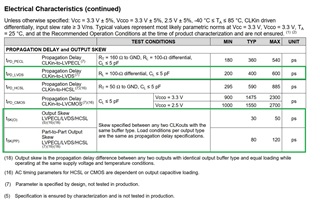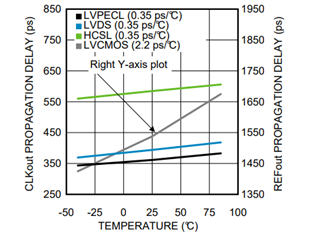Hi experts,
I'm using LMK00304 in my design. there are two parts in my board, both inputs are driven by two outputs of a PLL with the same frequency and same phase, the frequency is 100MHz, I want to calculate the propagation delay and skew. I'm confused with the parameters in datasheet.
For propagation delay, it's 200ps - 400ps - 600ps, min-typical-max.
While the Part-to-part output skew is 80ps -120ps, typical-max.
if I had one component with a propagation delay of 200ps, and the other was 600ps, then the Part-to-Part skew must be like 600ps -200ps = 400ps, then how do you get the Part-to-part skew of 80ps-120ps, which should be impossible.
Any suggestion?

Regards
Chris


